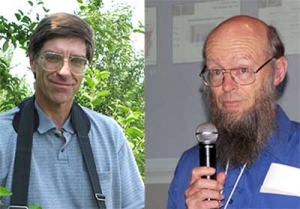
Alan Lakso, left, and John Palmer. (photos courtesy Alan Lakso and Richard Lehnert/Good Fruit Grower)
The Cornell University Fruit Team will hold an in-depth school for tree fruit growers, extension educators, and crop consultants on March 25 at the Ramada Inn in Geneva, New York.
The school will focus on fruit crop physiology and the application of physiological principles in the orchard.
The meeting will feature—and pay tribute to—six scientists who have been leaders in fruit physiology for the last 35 to 40 years and who are all retiring.
The six, and the topics of their presentations, are:
Ted DeJong, University of California-Davis, Peach Physiology;
James Flore, Michigan State University, Cherry Physiology;
Duane Greene, University of Massachusetts, Plant Growth Regulation;
Alan Lakso, Cornell University, Photosynthesis, Fruit Growth and Development;
John Palmer, Plant and Food Research, New Zealand, Physiology of Light Interception, Orchard Design, and Fruit Quality;
James Syvertsen, University of Florida, Water Relations and Irrigation.
Attendance will be limited to 200 people. The meeting is being promoted to tree fruit growers in the Eastern United States. The fee for the course is $100.
Details and registration information are available at the Web site http://events.cals.cornell.edu/indepthschool2014. For more information call Gemma Osborne at (315) 787-2248, or email her at gro2@cornell.edu.
Attendees can opt in to an evening dinner ($50) with 120 scientists who will be attending the two-day scientific symposium on fruit crop physiology that begins the next day. That symposium, March 26-28, is being convened by Cornell’s Dr. Terence Robinson and Dr. Lailiang Cheng on behalf of the International Society for Horticultural Sciences. Again, the symposium with recognize the long, productive careers of the six retiring scientists.
“The symposium will bring together scientists who are working on whole plant physiology of fruit crops to discuss the progress which has been made in the last 40 years and to map the work for the next 20 years,” Robinson said. “This meeting will focus not only on the advances in knowledge of fruit crop physiology but also the application of physiological principles in fruit production.”

Leave A Comment